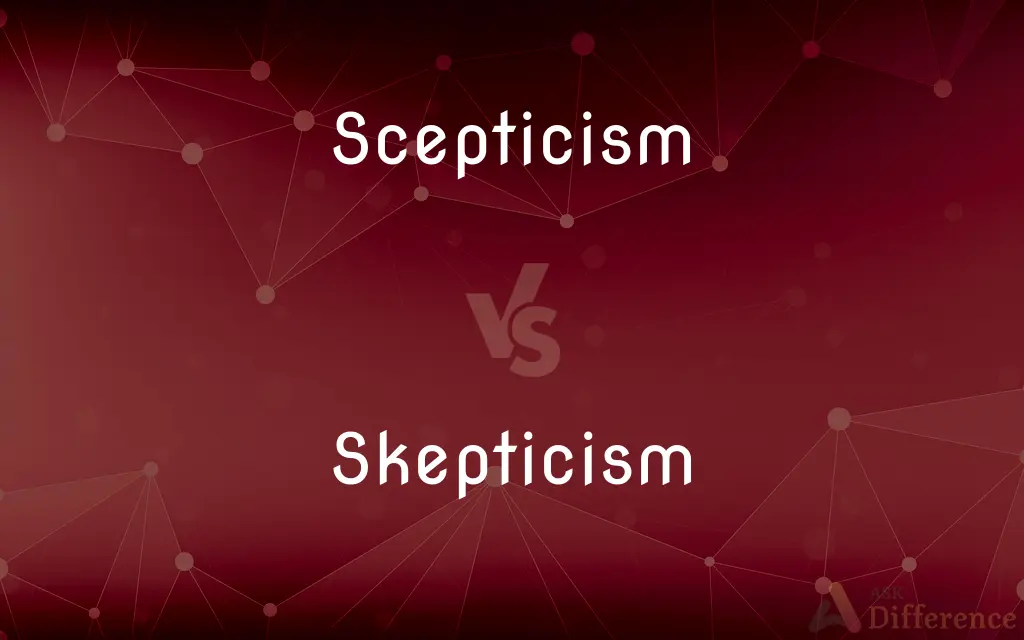Scepticism vs. Skepticism — What's the Difference?
Edited by Tayyaba Rehman — By Fiza Rafique — Updated on April 17, 2024
Scepticism, often seen in British English, emphasizes questioning and doubt, whereas skepticism, its American counterpart, similarly challenges certainty and truth.

Difference Between Scepticism and Skepticism
Table of Contents
ADVERTISEMENT
Key Differences
Scepticism is primarily used in British English to describe a philosophical attitude of doubt towards various forms of knowledge. Whereas skepticism is the American English spelling of the same term, used in similar contexts.
The philosophical roots of scepticism can be traced back to ancient Greece, where philosophers questioned the certainty of knowledge. On the other hand, skepticism, while sharing these roots, is often associated with modern scientific inquiry and empirical questioning.
In literature, scepticism is frequently explored in British texts as a theme questioning societal norms and beliefs. In contrast, American literature uses skepticism to critique both scientific and political establishments.
Education systems in the UK may encourage a sceptical approach to learning, urging students to question and analyze information critically. Conversely, in the US, educational emphasis on skepticism aims to foster scientific literacy and critical thinking skills.
Public discourse in Britain might reflect scepticism in discussions on political and social issues, promoting a cautious and questioning stance. Meanwhile, in the US, skepticism is commonly invoked in debates around topics like climate change and technology, stressing the need for evidence-based conclusions.
ADVERTISEMENT
Comparison Chart
Spelling
Scepticism
Skepticism
Usage in Texts
Predominantly in British English texts
Predominantly in American English texts
Philosophical Use
Emphasis on historical philosophical doubt
Focuses on empirical and scientific questioning
Educational Focus
Critical analysis and questioning in learning
Emphasis on scientific literacy and critical thinking
Common Themes
Questioning societal norms
Critique of science and politics
Compare with Definitions
Scepticism
Doubt as to the truth of something.
His scepticism about the project's viability made him cautious.
Skepticism
The ancient philosophical stance that true knowledge is uncertain.
Skepticism drives many debates in philosophy regarding the nature of reality.
Scepticism
Reluctance to believe without convincing evidence.
There was a hint of scepticism in his voice as he spoke.
Skepticism
Doubt regarding the truth of something.
His skepticism was apparent when he questioned the statistics in the report.
Scepticism
The theory that certain knowledge is impossible.
The philosophy class discussed scepticism in the context of modern science.
Skepticism
A method of questioning whether certain knowledge can be obtained.
Skepticism in scientific methods is healthy and often leads to better results.
Scepticism
A skeptical attitude; doubt as to the truth of something.
Her scepticism was evident in her not accepting the claims without evidence.
Skepticism
The attitude of doubting knowledge claims set forth in various contexts.
Her skepticism towards internet sources made her double-check all facts.
Scepticism
A school of philosophy from ancient Greece that doubted the possibility of achieving true knowledge.
He studied the scepticism of the Sophists.
Skepticism
Hesitation to accept facts without direct evidence.
His skepticism about global warming changed after he studied the scientific findings.
Scepticism
Variant of skepticism.
Skepticism
Skepticism (American and Canadian English) or scepticism (British, Irish, Australian, and New Zealand English) is generally a questioning attitude or doubt towards one or more putative instances of knowledge which are asserted to be mere belief or dogma. Formally, skepticism is a topic of interest in philosophy, particularly epistemology.
Scepticism
(British spelling) skepticism
Skepticism
A doubting or questioning attitude or state of mind; dubiety.
Scepticism
The disbelief in any claims of ultimate knowledge
Skepticism
The ancient school of Pyrrho of Elis that stressed the uncertainty of our beliefs in order to oppose dogmatism.
Skepticism
The doctrine that absolute knowledge is impossible, either in a particular domain or in general.
Skepticism
A methodology based on an assumption of doubt with the aim of acquiring approximate or relative certainty.
Skepticism
Doubt or disbelief of religious tenets.
Skepticism
The practice or philosophy of being a skeptic.
Skepticism
A studied attitude of questioning and doubt
Skepticism
The doctrine that absolute knowledge is not possible
Skepticism
A methodology that starts from a neutral standpoint and aims to acquire certainty though scientific or logical observation.
Skepticism
Doubt or disbelief of religious doctrines
Skepticism
An undecided, inquiring state of mind; doubt; uncertainty.
That momentary amazement, and irresolution, and confusion, which is the result of skepticism.
Skepticism
The doctrine that no fact or principle can be certainly known; the tenet that all knowledge is uncertain; Pyrrohonism; universal doubt; the position that no fact or truth, however worthy of confidence, can be established on philosophical grounds; critical investigation or inquiry, as opposed to the positive assumption or assertion of certain principles.
Skepticism
A doubting of the truth of revelation, or a denial of the divine origin of the Christian religion, or of the being, perfections, or truth of God.
Let no . . . secret skepticism lead any one to doubt whether this blessed prospect will be realized.
Skepticism
Doubt about the truth of something
Skepticism
The disbelief in any claims of ultimate knowledge
Common Curiosities
How does scepticism influence British literature?
Scepticism in British literature often explores themes of social and philosophical doubt.
Is there a philosophical difference between scepticism and skepticism?
Philosophically, they are identical, focusing on doubt and questioning of perceived truths.
How does scepticism manifest in everyday life in the UK?
It manifests as a general attitude of questioning and not taking information at face value.
What is the main difference between scepticism and skepticism?
The main difference is spelling; 'scepticism' is used in British English and 'skepticism' in American English.
Are there synonyms for scepticism and skepticism that convey a similar sense of doubt?
Yes, words like doubt, disbelief, and questioning carry similar connotations.
What role does skepticism play in American education?
Skepticism in American education promotes critical thinking and scientific inquiry.
Can both scepticism and skepticism be used interchangeably?
Yes, they can be interchangeably used depending on the form of English being applied, as they mean the same.
Does skepticism contribute to a distrust in government in the US?
It can contribute to questioning government decisions and policies, fostering a more informed and critical citizenry.
What are the historical roots of skepticism?
Skepticism has its roots in ancient Greece, particularly with the philosophers who questioned the possibility of true knowledge.
How does skepticism affect scientific research in the US?
It encourages rigorous questioning and validation of hypotheses and theories.
Is skepticism viewed differently in different academic disciplines?
Yes, it might be encouraged in sciences and less so in disciplines that rely on interpretative theories, such as certain humanities.
Does scepticism have a negative connotation in British culture?
Not necessarily; it is often seen as a prudent approach to handling information and claims.
How does public discourse differ between scepticism in the UK and skepticism in the US?
In the UK, scepticism may be more philosophical and cautious, while in the US, it may be more empirical and challenging.
Can teaching scepticism/skepticism be beneficial in schools?
Yes, teaching students to be skeptical can foster critical thinking and independent problem-solving skills.
What impact does skepticism have on political discussions in the US?
It often leads to more rigorous scrutiny of political claims and policies.
Share Your Discovery

Previous Comparison
Diligent vs. Hardworking
Next Comparison
Pangolin vs. AnteatersAuthor Spotlight
Written by
Fiza RafiqueFiza Rafique is a skilled content writer at AskDifference.com, where she meticulously refines and enhances written pieces. Drawing from her vast editorial expertise, Fiza ensures clarity, accuracy, and precision in every article. Passionate about language, she continually seeks to elevate the quality of content for readers worldwide.
Edited by
Tayyaba RehmanTayyaba Rehman is a distinguished writer, currently serving as a primary contributor to askdifference.com. As a researcher in semantics and etymology, Tayyaba's passion for the complexity of languages and their distinctions has found a perfect home on the platform. Tayyaba delves into the intricacies of language, distinguishing between commonly confused words and phrases, thereby providing clarity for readers worldwide.















































